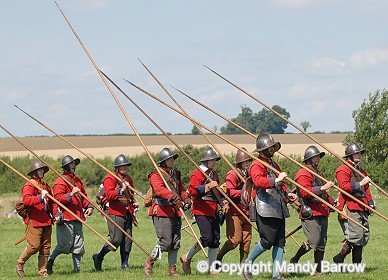Special Days Every Month
Celebrate and learn about special days
every day of the year!
|
First English Civil War begins
|
|
What caused the Civil War? The Civil War came as the result of a mounting tide of disagreement between King Charles I and Parliament. Like his father before him, Charles was a firm believer in the "divine right of kings". This was a belief that God had made someone a king and as God could not be wrong, neither could anyone appointed by him to rule a nation. Charles expected Parliament to do as he wanted; he did not expect it to argue with any of his decisions. From 1625 to 1629, but money and religion were the most common causes of arguments between Charles and Parliament. From 1629, after protests over taxation, the war with Spain, and attempts to allow toleration for Catholics, Charles ruled without Parliament. After about 11 years, Charles ran short of money to fight the Scots and had to recall Parliament in 1640. Only Parliament had the necessary money needed to fight a war and the required authority to collect extra money. By 1642, relations between Parliament and Charles had become worse than before, so much so that neither side was willing to back down over the principles that they held and war was inevitable as a way in which all problems could be solved. The country split into those who supported the king and those who supported Parliament – the classic ingredients for a civil war. On the 22nd August 1642, Charles raised his standard at Nottingham signallying what was to be the first Civil war. Less than seven years later, Charles was tried at Westminster Hall and found guilty that he had “traitorously and maliciously levied war against the present Parliament and the people therein represented.” Charles was executed on 30 January, 1649. |
See Teaching Resources for today’s date
Back to Facts of the Day Calendar
Jan | Feb | Mar | Apr | May | Jun | Jul | Aug | Sept | Oct | Nov | Dec
 © Copyright – please read © Copyright – please read All the materials on these pages are free for homework and classroom use only. You may not redistribute, sell or place the content of this page on any other website or blog without written permission from the . projectbritain.com | primaryhomeworkhelp.co.uk |
© Copyright 2013
is the creator of the Woodlands Resources section of the Woodlands Junior website.
The two websites projectbritain.com and primaryhomeworkhelp.co.uk
are the new homes for the Woodlands Resources.
left Woodlands in 2003 to work in Kent schools as an ICT Consulatant.
She now teaches computers at The Granville School and St. John’s Primary School in Sevenoaks Kent.
Woodlands Junior Homework Help new website
born on this day what happened on this day famous birthdays interesting facts did you know Interesting Calendar Facts.






